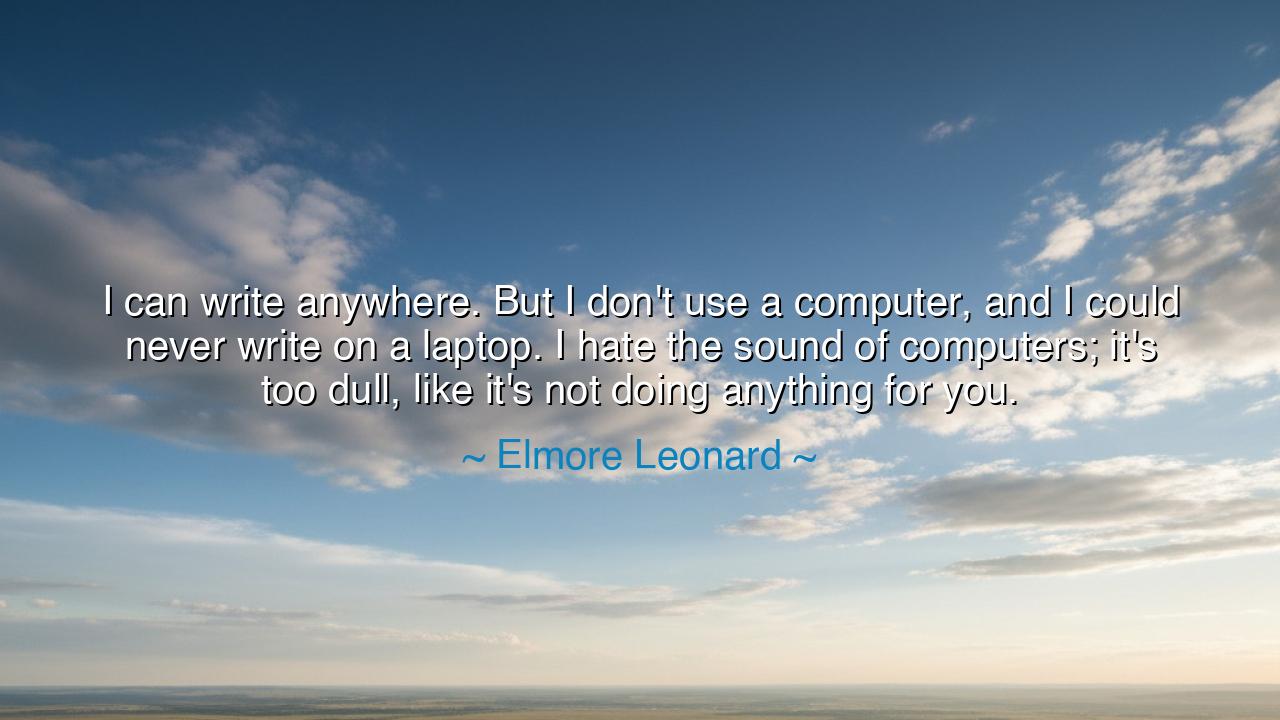
I can write anywhere. But I don't use a computer, and I could
I can write anywhere. But I don't use a computer, and I could never write on a laptop. I hate the sound of computers; it's too dull, like it's not doing anything for you.






In the age of endless screens and silent machines, the master storyteller Elmore Leonard spoke with the voice of one who cherished the living rhythm of words: “I can write anywhere. But I don't use a computer, and I could never write on a laptop. I hate the sound of computers; it's too dull, like it's not doing anything for you.” To those who hear only the surface, these words may sound quaint — the musings of a man resisting modernity. Yet beneath them lies a wisdom far deeper: a reverence for the intimate bond between the hand, the mind, and the word, a belief that art is not born of convenience, but of connection.
The origin of this quote rests in the life of Leonard himself, one of the great American craftsmen of the written word. A novelist of sharp wit and sharper dialogue, he shaped the landscape of crime fiction and Western storytelling. But Leonard was no lover of machinery — his tools were paper, pen, and patience. He came from a time when writing was a tactile ritual, when each stroke of ink carried the weight of thought. For him, the act of writing was not about speed, but about presence — the stillness of the writer alone with his ideas, the soft whisper of the page beneath his hand. His disdain for the “dull sound of computers” was not born of ignorance, but of devotion — a belief that the pulse of creation should be felt, not automated.
When Leonard says, “I can write anywhere,” he speaks as one whose imagination is not bound by walls or wires. True inspiration, he implies, lives not in the device, but in the heart. He could write in a café, a train station, or a quiet room — for wherever the spirit of story followed him, there he was home. Yet his refusal to use a computer reveals something more profound: that creativity demands texture, resistance, and effort. The keyboard, with its mechanical click, creates distance — a barrier of plastic between thought and expression. But the pen, moving across the page, slows the mind to the rhythm of the soul. Each word, born through the drag of ink, becomes an act of living labor, a covenant between the writer and the world he creates.
In his rejection of technology, Leonard joins a lineage of creators who sought purity in their craft. Consider Leo Tolstoy, who wrote War and Peace by hand, line by patient line, as his wife copied his manuscripts into legible form. Or Emily Dickinson, who filled small envelopes with her poems, unseen by the world until long after her death. Like Leonard, these artists understood that the act of creation is sacred precisely because it is slow — because it demands one’s full attention, one’s full presence. In their labor, there was no dullness, no hum of machinery — only the pulse of life itself, echoing in every stroke of the pen.
Leonard’s hatred of the “sound of computers” carries a poetic truth. To him, it was not the literal sound he despised, but the lifelessness it symbolized — the hum of a machine that works without thought, without passion, without soul. The artist, by contrast, must feel the struggle, the shaping of raw material into form. The computer, efficient though it may be, numbs this intimacy. It promises speed, but steals silence; it offers precision, but robs the imperfections that make art human. Leonard reminds us that creation is not meant to be sterile — it is meant to be alive, unpredictable, imperfect.
There is also, hidden within his words, a lesson about discipline and independence. “I can write anywhere,” he says — and in that statement is the power of the artist who is not dependent on tools, trends, or technology. He needs no special conditions to summon his muse, no glowing screen to guide his thoughts. The world is his workshop, and his imagination, his only engine. This is the mark of a true creator: not the perfection of the tools, but the persistence of the will. The dull hum of computers may distract others, but Leonard’s world was one of quiet noise — the scratch of pen, the whisper of thought, the living sound of language being born.
So, O seeker of creation, take Leonard’s wisdom to heart. Do not mistake technology for inspiration, nor convenience for craft. Whether you write, paint, teach, or build, remember that the power of your work lies not in the tools you wield, but in the spirit you bring to them. If your art feels dull, return to the raw, the simple, the human. Let your hands work, let your mind wander, let the sound of your effort fill the silence. The computer may hum endlessly, but it cannot dream — that gift belongs only to you.
The lesson of Elmore Leonard’s words endures as a reminder of what it means to create in a world of machines: to keep the pulse of humanity alive in our art, to find meaning in effort, and to trust the imperfect hand over the perfect device. For it is not the machine that makes the masterpiece — it is the soul that refuses to surrender its voice.






AAdministratorAdministrator
Welcome, honored guests. Please leave a comment, we will respond soon